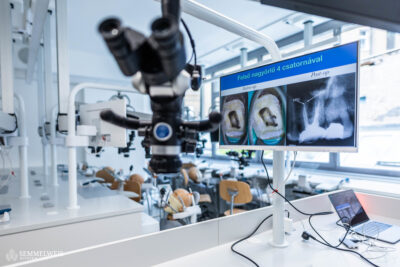Dr. Miklós Szócska, Dean of the Faculty of Health and Public Administration, undertook the launch of the course and is committed to the wider dissemination of sustainability as head of the Sustainable Development Presidential Commission Health Working Group at the Hungarian Academy of Sciences.
 The concept originated at Harvard University, the headquarters of an association that focuses on how the state of the environment affects the well-being of our civilisation,” said Dr. Nora Boussoussou, the course’s instructor, who was elected Planetary Health Ambassador in 2020. Planetary Health is a relatively new field of study, focusing on research and the development of adaptive capacity both at the individual level and for health professionals, helping society to achieve the highest standards of health. “We felt it was important to incorporate this approach into education,” she said, adding that this is the first comprehensive course on the topic in Hungary.
The concept originated at Harvard University, the headquarters of an association that focuses on how the state of the environment affects the well-being of our civilisation,” said Dr. Nora Boussoussou, the course’s instructor, who was elected Planetary Health Ambassador in 2020. Planetary Health is a relatively new field of study, focusing on research and the development of adaptive capacity both at the individual level and for health professionals, helping society to achieve the highest standards of health. “We felt it was important to incorporate this approach into education,” she said, adding that this is the first comprehensive course on the topic in Hungary.
The instructor stressed that recent human activity causes the greatest damage to nature, therefore health professionals of the future must be environmentally aware. „This is the fundamental aim of the course, so that economically responsible, environmentally aware professionals who apply sustainability as a basic principle in a quality healthcare system can graduate from university,” she stressed.
The course addresses sustainability in detail, namely how to make healthcare sustainable in terms of operation, and how to develop patient care in a way that it ensures adaptation to the destructive effects of current environmental factors. „They will discuss what effects the natural environment has on the health of individuals, and how those can be prevented. They will also look at good practices in health management that are already in use abroad, and can be adapted at home,” she said.
The course will cover the concept of cardiometeorology, created by Dr. Nora Boussoussou. Cardiometeorology is a new field of study that investigates how atmospheric parameters and climate change increase the incidence of cardiovascular disease. It is also concerned with developing prevention strategies against the negative effects of environmental factors that represent cardiovascular risks.
The research is being carried out at the National Laboratory of Climate Change established at the Városmajor Heart and Vascular Center, led by Dr. Péter Sótonyi.
The elective course is open to students from all faculties within the university and is recommended as all health sectors have a role to play in sustainability,” said Dr. Nora Boussoussou. The course is held in blocks every semester – 2 full days per semester – where, in addition to the lectures, they attempt to teach in an interactive way,” she stressed.
Those interested who take up the course can become involved in research at TDK or PhD level, moving towards a higher, more scientific level in the field,” the course instructor pointed out.
Bernadett Bódi
Translation: Viktória Kiss
Photo illustration: Attila Kovács – Semmelweis University


